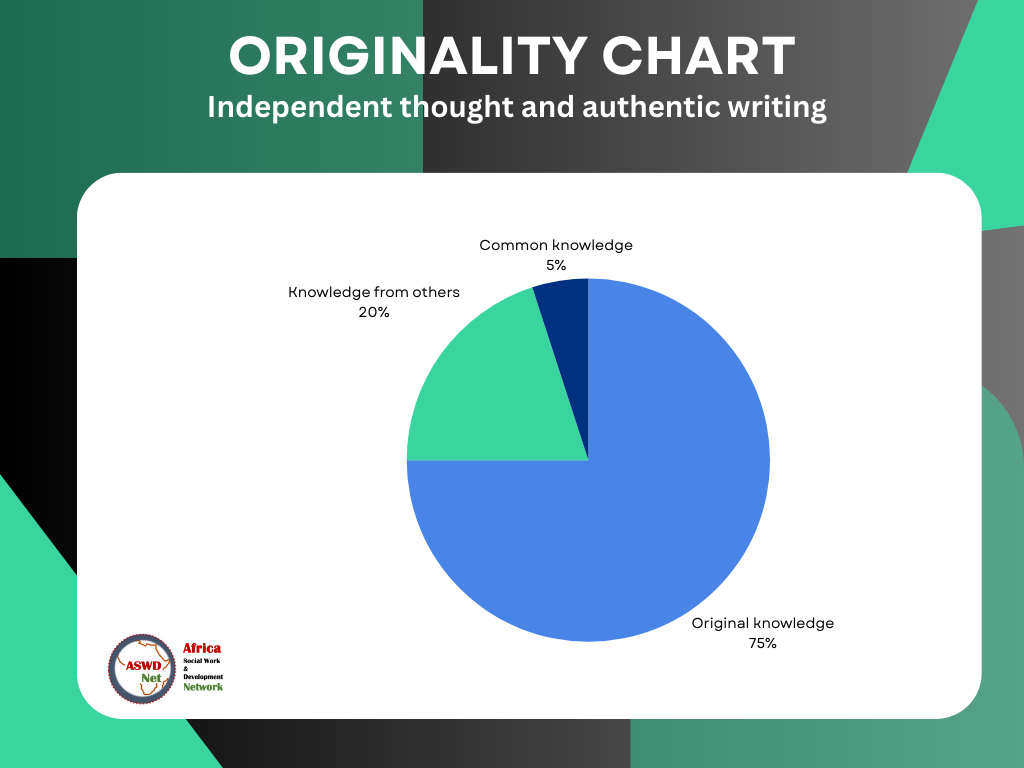
Strategies to achieve high levels of originality, independent thought and authentic writing
When writing — book chapters, book, blog post, social media message or journal article — it is important to think independently and write originally. This is important because society needs more new instead of recycled knowledge. Further, originality is positively related to indigenising and decolonising. For new writers, they can be forgiven because this skill develops with time, however, there is an unacceptable level of originality — above 75%.

What are some strategies to make products of our research or writing achieve this higher figure of originality?
- Use your imagination and experience as a straining point to think, generate concepts and develop ideas. Be inspired from within and around, not from outside and afar.
- Start thinking from your language then change to the language of writing. Do not start thinking in the language of writing.
- Start thinking from Ubuntu philosophy (Ubuntu thinking) then spread outwards — not to come back to your own worldview or philosophy afterwards.
- Take time to think to create ideas, the more time you take the better.
- Write and revise several times, the more time to do this the better the output.
- Avoid reading or searching on the internet without exhausting thinking. Artificial Intelligence, Google, Wikipedia, dictionaries should not replace thinking.
- Use your own words, avoid copy and paste or read and type.
- Avoid replicating research methods that were used by others or are common in textbooks — create or recreate.
- Speak your ideas, with your self or with some else (oral review) or give someone else to peer review your written work.
- If you can print on paper, PDF or ePub, do so — don’t just rely on Word on the screen.
- Write with an African publisher or publication in mind, publish locally.
- Write to build Africa, now and in the future., even when you are working or living outside the continent.
- When you use literature, don’t rely on what is popular or the high percentages in data, the low percentages and the unpopular tell bigger stories.
- Decolonise — remove colonial knowledge from your memory, thoughts and avoid colonial sources, including databases.
- Indigenise — use oral literature and indigenous methods of telling or informing.
- Show where you used other people’s ideas (citing) but keep these at less than 25%.
- Increase originality by discussing your ideas and that of others. In a journal paper for example, the discussion and implications sections provide more room for originality.
- Speak Africa’s mind even if it is not supported by those from outside, because if Africa’s mind is not spoken, we will keep hearing other minds, and we end up taking them as the truth. The truth is arrived it when all minds are put on the table, there is fair debate without dominance. As Nabudere said, amagesi sigomu, no one worldview should dominate other worldviews.
- Don’t copy and paste images, pictures and graphics from the internet – instead take or create your own even for social media posts that you make. If you have to copy from the internet, then make sure they are relevant, cultural, sensitive and African.
- Lastly, set yourself a higher originality score, even if you are a student.
It is possible to think independently and to train or motivate others to do the same.
Use the form below to subscibe to Owia Bulletin.
Discover more from Africa Social Work & Development Network | Mtandao waKazi zaJamii naMaendeleo waAfrika
Subscribe to get the latest posts sent to your email.




I like it very well.